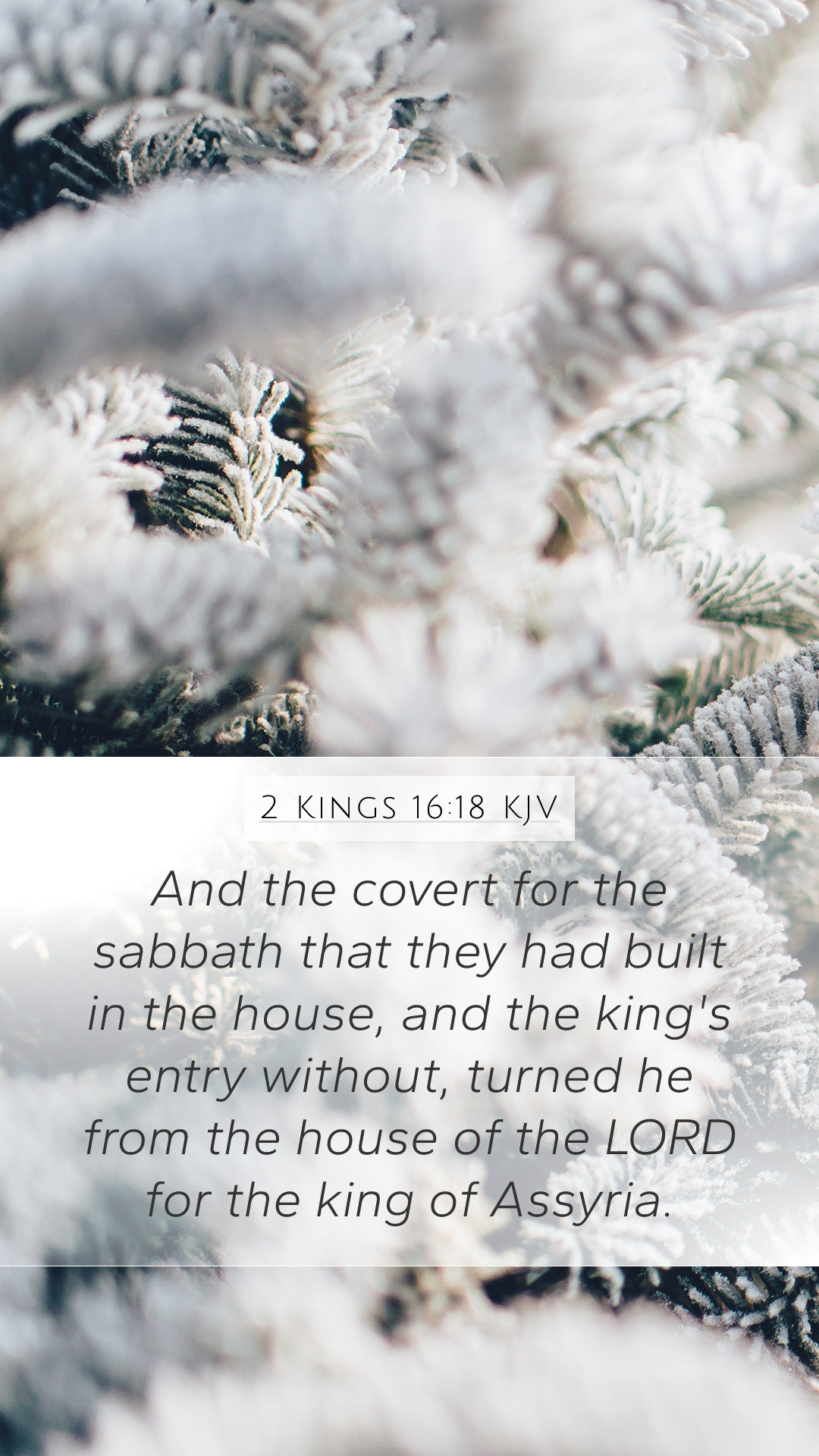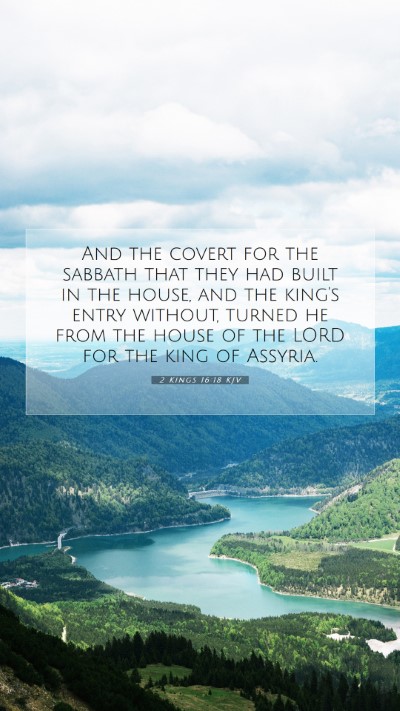Old Testament
Genesis Exodus Leviticus Numbers Deuteronomy Joshua Judges Ruth 1 Samuel 2 Samuel 1 Kings 2 Kings 1 Chronicles 2 Chronicles Ezra Nehemiah Esther Job Psalms Proverbs Ecclesiastes Song of Solomon Isaiah Jeremiah Lamentations Ezekiel Daniel Hosea Joel Amos Obadiah Jonah Micah Nahum Habakkuk Zephaniah Haggai Zechariah Malachi2 Kings 16:18 Meaning
What is the meaning of 2 Kings 16:18?
And the covert for the sabbath that they had built in the house, and the king's entry without, turned he from the house of the LORD for the king of Assyria.
2 Kings 16:18 Bible Verse Meaning
Understanding 2 Kings 16:18: A Comprehensive Commentary
The verse 2 Kings 16:18 states:
"And the covert for the sabbath that they had built in the house, and the king's entry without, turned he from the house of the LORD to the king's house, and the king's entry within where he had come in, he put on the outer court."
Overview of the Verse
This verse accounts for the actions of King Ahaz of Judah, highlighting his shifts in focus from the worship practices and locations associated with the LORD to his own constructions and interests. It reflects a critical period in Israel's history where the true worship and the legitimacy of sacred spaces are debated.
Insights from Public Domain Commentaries
Matthew Henry's Commentary
Contextual Analysis: Matthew Henry notes that Ahaz, acting out of convenience and aligning with the practices of surrounding nations, prioritized his own palace over the sacred sanctity of the temple. This shift exemplifies a broader trend of secularization where the king endorses non-Israelite worship practices.
Moral Lessons: The neglect of the temple in favor of personal interests serves as a cautionary tale for believers. Henry emphasizes the importance of prioritizing spiritual commitments over worldly pursuits. He encourages readers to maintain dedication to their faith amidst distractions.
Albert Barnes' Notes
Interpretation of the Covert: Barnes elaborates on the term "covert," suggesting that the associated structures were built for the king’s convenience, reflecting Ahaz’s departure from traditional worship practices. He emphasizes the critical consequences of this shift for the nation of Judah.
Symbolism and Significance: Ahaz’s modifications hint at a pragmatic approach but further symbolize a waning reverence for God's instructions. Barnes encourages readers to be wary of adopting similar attitudes and highlights the long-term repercussions of forsaking the faith for personal gain.
Adam Clarke's Commentary
Historical Context: Clarke places the actions of Ahaz within the historical framework of turmoil in Judah, portraying a king who, fearing for his throne and his people, opts for alliances that compromise religious integrity. He reflects on the temptation leaders face when political and spiritual convictions collide.
Lessons for Today: Clarke encourages reflection on the balance between faith and political expediency. He warns against sacrificing spiritual truths for the sake of temporal safety and urges believers to evaluate their life choices against biblical standards.
Thematic Analysis
This verse invites readers to grapple with the themes of:
- Worship and Idolatry: The verse underscores Ahaz's turning away from God, portraying the dangers of idolatry that pervaded Israel.
- Leadership and Influence: It highlights the role of a leader in shaping national identity and spiritual health, calling modern leaders to reflect on their influence.
- Temptation and Faithfulness: Believers are challenged to remain steadfast in faith during trying times, resisting the lure of convenience.
Application for Daily Life
For contemporary believers, this verse prompts critical self-examination regarding:
- The prioritization of spiritual practices amidst daily life distractions.
- The importance of community worship settings, such as Bible study groups, which foster deeper understanding and commitment.
- How one navigates the pressures of society while maintaining integrity in faith.
- Utilizing Bible study tools to deepen understanding of Scripture, ensuring informed approaches to worship and belief.
Cross References
Related scriptures that enrich the understanding of 2 Kings 16:18 include:
- 2 Chronicles 28:1-25: A parallel account highlighting Ahaz's reign.
- Isaiah 7: The prophecy given during Ahaz's time, offering insight into the geopolitical and spiritual crisis.
- 1 Kings 12:26-30: Historical context regarding the larger narrative of idol worship in Israel.
Conclusion
In sum, 2 Kings 16:18 serves as a critical reflection on faith practice in leadership, the risks of secular influences, and the call to uphold the covenant relationship with God. Engaging with the insights of public domain commentaries enriches one's Bible verse understanding and evokes meaningful Bible verse interpretations necessary for navigating contemporary challenges in faith.


